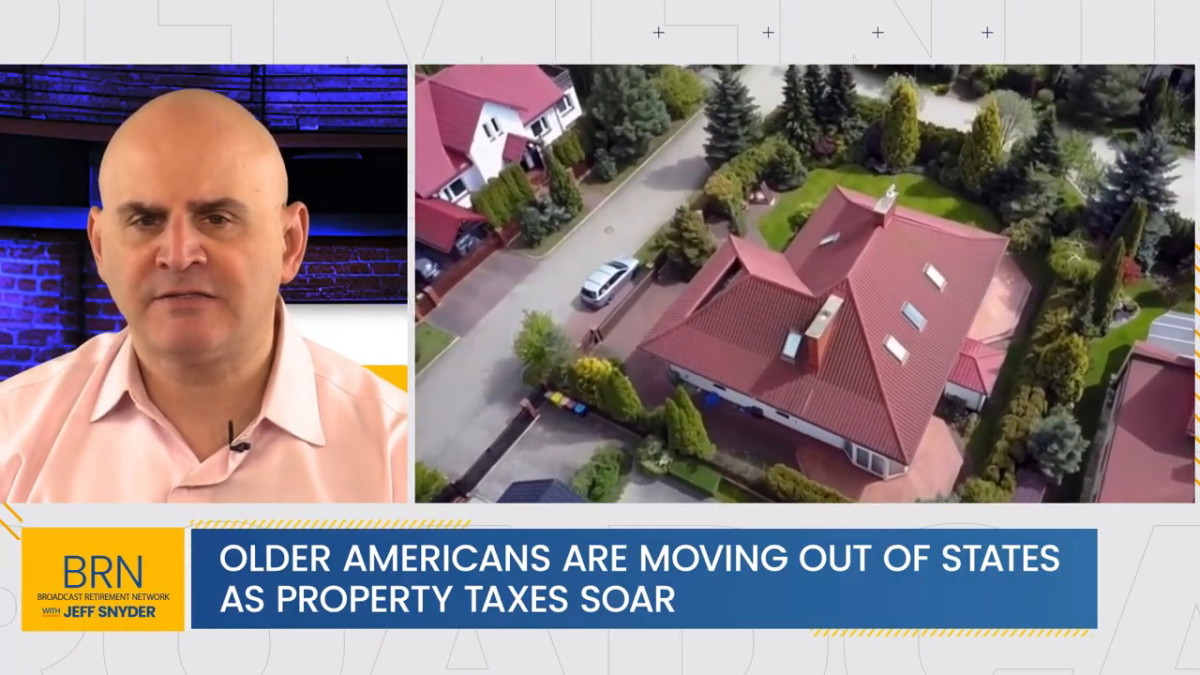Old Americans Are Moving Out of States as Property Taxes Soar
Property taxes are a huge expense, especially for retirees

Sky-high property taxes in large metros like New York City, Philadelphia, and Chicago are driving retirees out and fueling an internal migration to other cities. Western and Southern states have set themselves apart for having the lowest property taxes in the U.S. at under 0.5%. Broadcast Retirement Network's Jeffrey Snyder discusses what you need to know with Ian Kennedy and Chris Porter of John Burns Research and Consulting.
Jeffrey H. Snyder, Broadcast Retirement Network
(0:04) This morning on BRN, older Americans are moving out of states as property taxes soar. (0:11) Joining me now to help break it all down, Chris Porter and Ian Kennedy are with John Burns Research and Consulting. (0:19) Chris, Ian, great to see you.
(0:20) Thanks for joining us in the program this morning. (0:22) Thank you.
Ian Kennedy, John Burns Research and Consulting
(0:24) Thank you for having us, Jeff.
Jeffrey H. Snyder, Broadcast Retirement Network
(0:25) Yeah, let's, Ian, I want to start with you. (0:27) I mean, this is, I think a lot of people, myself included, I mean this, don't appreciate the impact of property taxes, especially as you get older and reach retirement age. (0:40) You, Chris, and the team at John Burns, you've done a complete analysis.
(0:45) What's the impact? (0:46) What are retirees thinking when it comes to their property taxes?
Ian Kennedy, John Burns Research and Consulting
(0:51) Yeah, so the property tax situation definitely varies mainly on the state level and sometimes even within states. (1:03) So typically, you know, Northeast, West Coast metros tend to have higher property tax rates than the rest of the country. (1:13) However, there are some kind of egregious outliers there.
(1:17) A couple that we like to point out in particular are places like New York State, the state of Illinois, those two states really have much higher property taxes than your surrounding states. (1:31) So you can imagine someone that might live in metro New York or metro Chicago who may (1:41) think about moving to, say, the Carolinas or Texas, well, up in metro New York, you're (1:48) looking at a property tax rate around 2%, same with metro Chicago, whereas if you were (1:53) to move down to, let's say, South Carolina or Florida, all of a sudden you're probably (1:59) going to be seeing about a one percentage point decrease in that property tax.
(2:04) And obviously, the property tax impact varies depending on who is the consumer. (2:12) If you're a younger consumer like myself, you might be more swayed by things like income tax rates. (2:21) But for older folks whose income have largely kind of fallen off a bit and who maybe aren't as much of a consumer and aren't as concerned with things like sales taxes, the property taxes do become a big part of that equation when thinking about where do I want to settle down.
Jeffrey H. Snyder, Broadcast Retirement Network
(2:40) Chris, let's talk about the, thank you for that, Ian, and Chris, I want to talk about the great migration, if you will, because during COVID, if you recall, and this is not just older people, mature people like myself, people moved all over the country because they were working remotely. (2:57) Now people are kind of back into the office. (3:00) But there appears to be a migration, as Ian was saying, based on the data to certain parts of the country, maybe that have lower property taxes.
Chris Porter, John Burns Research and Consulting
(3:10) No, I think you're right. (3:11) And I think property taxes is one piece of the puzzle, right? (3:14) There's so many other factors that impact people's move.
(3:16) You're right about the work from home or work remotely possibilities that really opened up during the pandemic that allowed more people to relocate. (3:26) For somebody who was always going to be a renter in California, they now had opportunities to move to Texas or to Tennessee and maybe become a householder, a homeowner for the first time in their life. (3:37) And so I think it really did open up the different parts of the country to people who just previously didn't necessarily have that choice before.
(3:46) What we've seen more recently is a slowing in those migration rates as we've seen mortgage rates go much higher. (3:54) People are less likely to move. (3:57) But one thing we have seen is that those same patterns really still are continuing.
(4:03) We still see continued migration out of the Northeast, out of the Midwest, into those southeastern, southern Texas, Florida and the Southeast states as well. (4:15) And as Ian pointed out, this really does align really well with a lot of the trends we're seeing in property taxes. (4:21) But I think we also just have to kind of look at the bigger picture and realize it's more than just the property tax.
(4:27) When it comes to housing, it's also maintenance and it's also insurance becoming an increasingly big part of people's housing budget every single year. (4:36) Not to mention the fact that interest rates are particularly high and home prices are high, so their mortgage payment is that much higher as well. (4:43) So a lot of factors playing into consumers' decisions to move.
Jeffrey H. Snyder, Broadcast Retirement Network
(4:49) And just to follow up on that, Chris, and then Ian, I'll come back to you. (4:53) You know, when you hit, neither of us is retired, especially Ian, he's on the younger side, as he said. (4:59) But when you get to be retired and you have a fixed income, there's a lot of things, your perspective changes.
(5:06) Ian hit on this. (5:09) You know, what is that? (5:10) You know, is this something that retirees actively think about?
(5:14) Do they think about, hey, I live in a high tax state like New York. (5:18) I live in a high tax state like Illinois. (5:22) I love my house, but you know what?
(5:24) I can get more for my money. (5:25) Let me sell the house. (5:26) I'm paying all these taxes.
(5:28) I'm not taking advantage. (5:29) Let me move to Florida, South Carolina, as you all were saying.
Chris Porter, John Burns Research and Consulting
(5:33) You know, it's you're exactly right. (5:35) But I do think it is one factor out of many that influences their decisions. (5:39) I mean, when we look at the big, broad picture of this and we look at what are the percentages of people age 55 plus or 65 plus that move in a given year, I mean, it's still a very small percentage of the overall.
(5:50) Right. (5:50) Most people tend to age in place and stay where they've they've lived the last 30 or so years. (5:56) I think it's less than 5 percent of the 65 plus population that actually moves in a given year.
(6:02) So for them, yes, I think property taxes does become one of those those factors that plays into their decision to move. (6:11) Anecdotally, can can think of a couple of instances where people are now thinking about excuse me, about insurance as an increasing cost and influencing the decision whether to to move to a new location or not.
Jeffrey H. Snyder, Broadcast Retirement Network
(6:23) And do you think that there are some lessons here for if I were a policymaker, a lawmaker, someone responsible for property taxes, I probably don't want typically older Americans have more wealth. (6:36) I probably don't want them going to another state. (6:39) Are there some lessons here in terms of for some of these other states that people are leaving from to say, hmm, maybe I need to rethink my taxation of property, maybe lower create incentives for people to remain or to come to my state?
(6:53) I mean, you know, are they are they taking pause by by this data from this data? (6:58) I should say, excuse me.
Ian Kennedy, John Burns Research and Consulting
(7:00) Yeah, that's a that's a good question, and it is tough on the property tax front to to really make a dent in in what a homeowner is paying. (7:11) A lot of states rely on property tax income for their share of their of their state budget. (7:18) That being said, there could be an argument to maybe say even out that sales tax, income tax, property tax.
(7:28) Aggregation and where you're not so heavy on one of those those avenues, you know, for example, I live up in outside of the Providence area in Rhode Island and I'm from Massachusetts originally. (7:41) And the state of New Hampshire is kind of known in New England to not have a sales tax. (7:48) However, they have some of the highest property taxes in New England to kind of account for that.
(7:54) So evening that playing field definitely is is one of the best ways that states can go about doing that. (8:00) However, obviously, that is a big lift, especially when states rely so heavily on on that property tax.
Jeffrey H. Snyder, Broadcast Retirement Network
(8:08) Yeah. (8:09) Yeah. (8:09) I mean, I think Chris makes some really good points.
(8:13) It's kind of hard when you got a good source of revenue, whether you're a business or a government, it is hard to reform and, you know, and change what you're doing because there's a lot of unknowns. (8:26) But do you think that people will think about maybe other ways of living, for example, instead of having a home, maybe an RV, maybe a trailer, maybe I don't know, maybe renting or going from owning a home to renting. (8:44) That, too, could have an impact, first on migration, but also on tax tax revenue that these states receive.
(8:52) So I feel like there's a lot changing there, I guess. (8:55) Am I wrong on that?
Chris Porter, John Burns Research and Consulting
(8:56) No, you're not. (8:57) And we actually saw, you know, after the great financial crisis, saw a big shift and sort of especially among older adults, that sentiment around the idea of renting. (9:06) I think these this generation had always been raised to be homeowners.
(9:10) That was the mentality they were raised with. (9:12) And we did see a bit of a shift towards more renting amongst older adults. (9:19) You know, part of part of it's a lifestyle choice.
(9:21) They like the idea of sort of a lock and leave lifestyle. (9:24) Maybe the taxes play into that as well. (9:26) But, you know, I think some of that.
(9:29) Maybe if you want to call it a stigma, maybe that had been attached to renting in older age or as you get older, has somewhat gone away. (9:38) And I think we are seeing a little bit of a shift in the way that that older adults think about ownership versus rentership.
Jeffrey H. Snyder, Broadcast Retirement Network
(9:45) Yeah. (9:46) And what about planned communities, senior living? (9:50) I mean, is that popping up?
(9:51) I know that's more commercial, but it is residential in some ways. (9:55) Is that popping up on the radar screen in terms of what you're seeing in terms of trends?
Ian Kennedy, John Burns Research and Consulting
(10:03) Well, we are seeing in in the broader builder community that there is kind of a push towards what we have been calling build to rent. (10:13) So essentially builders that are coming in and building a community specifically to rent out those single family homes down the line. (10:22) And some of the push in that regard is to kind of overcome the affordability issue that we have.
(10:29) And that's mainly for folks like millennials, Gen Zers like myself who might opt to rent instead of throw down that hefty down payment with the mortgage rates where they are today. (10:42) But the the second portion of that kind of demand avenue is senior citizens, is the folks who maybe maybe are going to sell their primary residence, but are looking at the current market and saying maybe it's not the best idea to go and buy another home with my savings that I've accumulated. (11:05) So that is another avenue where we see builders kind of moving into this build to rent avenue, focusing on a longer term renter rather than a longer term owner, if that makes sense.
Jeffrey H. Snyder, Broadcast Retirement Network
(11:17) Yeah, it does. (11:18) Absolutely, Chris. (11:18) And I guess I'll end with you.
(11:20) I mean, I can't. (11:22) I'm in my 50s, early 50s, soon to be another year older. (11:26) I'll leave it there.
(11:27) I won't tell you how old I am. (11:29) But, you know, I often think about I don't want to fix a roof. (11:34) I don't want to have to call the plumber.
(11:36) I'd rather go to the maintenance in my apartment building and have them do it. (11:41) The stigma, as you said before, has changed. (11:44) I think people are a little bit more pragmatic and practical than they have ever been.
(11:49) And I think I think that's going to necessitate new building ideas, as Ian was talking about.
Chris Porter, John Burns Research and Consulting
(11:55) No, I think you're exactly right. (11:56) And just as we're getting older, our houses are getting older, too. (11:59) And, you know, just as I'm having more issues as I get older, so does my house.
(12:04) And so I think that, you know, we see on that build to rent product that he's talking about. (12:10) One of the things that people love about it is the maintenance free lifestyle that you've got somebody who's taking care of it. (12:16) It's a professionally run environment, much like you'd see in an apartment complex.
(12:20) And I think really one of the keys, especially as you're targeting, you know, the active adult or senior citizen, is let's create a lifestyle. (12:27) So it's not just a, you know, build the houses and let them be. (12:31) But it's about creating the amenities, about creating community.
(12:34) And I think that's really important for somebody who's making that decision about whether to own versus rent. (12:42) You know, if you've accumulated a lot of possessions over your lifetime, you know, maybe a two bedroom apartment isn't going to satisfy your need for space. (12:51) But a single family home that you could rent that's new construction and somebody else is taking care of the maintenance for you and they've got, you know, some amenitization.
(13:01) Boy, that's that's a no brainer.
Jeffrey H. Snyder, Broadcast Retirement Network
(13:03) Yeah, I mean, all these trends, gentlemen, we're going to have to leave it here, but I'll just end by saying all these trends are so fascinating. (13:09) And I think we're just kind of scratching the surface as to what they are and when the impact will be to how we plan our future years. (13:19) Ian, Chris, so great to see you.
(13:21) Thanks for joining us. (13:22) Great research. (13:23) And we look forward to having you back on the program again very soon.
Ian Kennedy, John Burns Research and Consulting
(13:26) Thank you. (13:27) Thanks, Jay.
Jeffrey H. Snyder, Broadcast Retirement Network
(13:28) And don't forget to subscribe to our daily newsletter, The Morning Pulse, for all the news in one place. (13:33) Details, of course, at our website. (13:35) And your subscription helps underwrite all this great BRN content.
(13:40) And we're back again tomorrow for another edition of BRN. (13:42) Until then, I'm Jeff Snyder. (13:43) Stay safe, keep on saving and don't forget, roll with the changes.
What's Your Reaction?




















































